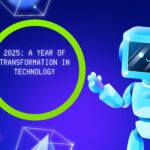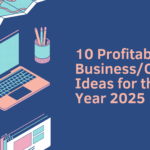The year 2025 is developing into a pivotal moment in the realm of technology. As we delve deeper into the 21st century, the speed of innovation has surged beyond what many of us could have envisioned. From artificial intelligence (AI) and quantum computing to space exploration and sustainable technologies.
- Artificial Intelligence: Smarter and More Integrated
Smarter and More Integrated
- AI remains at the forefront of technological progress in 2025. While AI-driven tools and systems have become integral to industries ranging from healthcare to finance, this year signifies a critical juncture. Here are some essential trends in AI for 2025:
- Generative AI Evolution: Tools such as ChatGPT, DALL•E, and others have advanced, providing increasingly human-like creativity. Businesses utilize these tools for content generation, product design, and even customer service, creating a seamless integration between human creativity and machine performance.
- AI in Personalized Healthcare: AI-powered wearable devices are now tracking health metrics in real time, delivering predictive diagnostics. These devices not only monitor symptoms but also provide preventive recommendations, connecting the gap between medical consultations and everyday health management.
- AI Ethics and Regulations: As AI gains greater capabilities, 2025 witnesses the introduction of stricter ethical standards and regulatory frameworks to ensure responsible use, addressing issues related to privacy, bias, and transparency.
- Quantum Computing: From Theory to Application
From Theory to Application
Quantum computing, once considered a futuristic vision, is emerging as a practical reality. In 2025:
- Breakthroughs in Material Science: Quantum computers are now resolving challenges in material science that were once deemed insurmountable. These advancements facilitate the development of stronger, lighter, and more sustainable materials for sectors like aerospace and construction.
- Financial Modeling: Banks and financial institutions employ quantum algorithms for portfolio optimization, fraud detection, and market prediction, enhancing the robustness and efficiency of financial systems.
- Drug Discovery: The pharmaceutical sector is a significant beneficiary of quantum computing, expediting the development of new medications and treatments by simulating complex molecular interactions on an unprecedented scale.
- Space Exploration: The New Frontier
The New Frontier
2025 is a significant year for space exploration, with both governmental and private initiatives expanding the limits of what humanity can accomplish:
- Lunar Bases: NASA and companies like SpaceX are establishing semi-permanent bases on the Moon, acting as launchpads for upcoming Mars missions.
- Space Tourism: Once exclusive to billionaires, space travel is now becoming obtainable to a wider audience. Companies such as Blue Origin and Virgin Galactic are making space travel more accessible, though still at a luxury price point.
- Satellite Networks: Mega-constellations of satellites are improving global internet connectivity, bringing the promise of digital inclusion to even the most isolated areas.
- Sustainable Technologies:
The Greener Tomorrow
As climate change continues to pose a critical challenge, 2025 witnesses a rise in technologies focused on sustainability:
- Green Energy Innovations: Solar panels boasting efficiency rates exceeding 50% and advanced wind turbines lead the renewable energy landscape. Breakthroughs in energy storage, such as solid-state batteries, enhance the reliability of renewable energy.
- Carbon Capture and Utilization: Technologies that not only capture CO2 but also convert it into valuable products like fuels and building materials are being scaled up, providing practical methods to decrease greenhouse gas emissions.
- Circular Economy: Businesses are increasingly embracing circular business models, concentrating on recycling and reusing materials to reduce waste. AI-driven sorting facilities are making recycling more efficient than ever.
- The Metaverse: A New Digital Reality
The idea of the metaverse, while still developing, makes significant progress in 2025:
- Immersive Workspaces: Virtual reality (VR) and augmented reality (AR) technologies establish collaborative workspaces that feel as real as physical offices. Remote work becomes increasingly engaging and productive.
- Digital Economies: Blockchain and cryptocurrency integrations within the metaverse facilitate strong digital economies. Virtual real estate, NFT marketplaces, and digital art flourish, blurring the boundaries between physical and virtual assets.
- Education and Training: The metaverse transforms education by providing immersive learning experiences. From virtual labs to history lessons that immerse students in ancient civilizations, the possibilities are limitless.
- Biotechnology and Genetic Engineering: Redefining Life
Biotechnology experiences groundbreaking advancements in 2025, yielding significant implications for medicine, agriculture, and more:
- CRISPR 2. 0: Gene-editing technologies become more accurate and accessible, allowing for the treatment of genetic disorders and the creation of disease-resistant crops.
- Synthetic Biology: Scientists are developing synthetic organisms designed for specific tasks, such as cleaning oil spills or generating biofuels.
- Personalized Medicine: Progress in genomics and AI facilitates treatments customized to an individual’s genetic composition, greatly enhancing outcomes and minimizing side effects.
- Cybersecurity: Keeping Up with the Threats
As technology progresses, so do the threats. Cybersecurity remains a vital focus area in 2025:
- AI-Driven Threat Detection: Cybersecurity systems employ AI to anticipate and neutralize threats before they appear, making systems more resistant to attacks.
- Zero-Trust Architecture: Organizations implement zero-trust models, where every user and device is authenticated, ensuring tighter security for digital ecosystems.
- Quantum-Resistant Cryptography: With the advent of quantum computing, new cryptographic techniques are being developed to safeguard sensitive data against quantum-enabled breaches.
- Human-Machine Collaboration: Enhancing Productivity
Enhancing Productivity
The interaction between humans and machines continues to advance, highlighting collaboration instead of replacement:
- Cobots in Manufacturing: Collaborative robots (cobots) operate alongside humans in factories, boosting productivity and safety.
- Exoskeletons: Wearable robotic suits support workers in physically challenging jobs, decreasing the risk of injuries and enhancing efficiency.
- AI-Powered Creativity: Artists, writers, and musicians are utilizing AI as a tool to enrich their creative processes, exploring new horizons in art and entertainment.
- Autonomous Systems: A Step Towards Independence
From self-driving cars to autonomous drones, 2025 sees significant advancements in autonomous systems:
- Level 5 Autonomy: Fully autonomous vehicles hit the streets in select cities, offering a glimpse into a future without human drivers.
- Delivery Drones: Autonomous drones are revolutionizing logistics, delivering everything from packages to medical supplies in record time.
- Smart Cities: Autonomous systems integrate with smart city infrastructures, optimizing traffic flow, reducing energy consumption, and enhancing public safety.
- The Ethical Dilemmas of Progress
With great power comes great responsibility. As technology advances, ethical considerations become increasingly important:
- Data Privacy: Striking a balance between innovation and privacy remains a challenge, especially with the proliferation of AI and IoT devices.
- Job Displacement: While automation boosts efficiency, it also raises concerns about job displacement. Reskilling programs and education reforms are crucial to address this issue.
- Digital Divide: Ensuring equitable access to technology is vital to prevent widening the gap between the haves and have-nots.
Conclusion
The year 2025 exemplifies the creativity and resilience of humankind. Although obstacles persist, the innovations ahead bring optimism for a more luminous, interconnected, and sustainable future. As we traverse this transformative period, it is crucial to engage with technological advancements responsibly, guaranteeing that these innovations serve the needs of all humanity. In 2025, technology transcends being merely a tool; it acts as a driver for transformation, influencing the world in manners we are just starting to comprehend.



